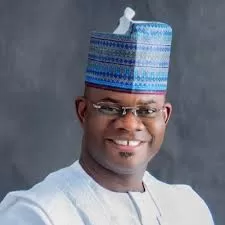
FG FILES FRESH 16-COUNT CHARGES AGAINST EX-KOGI GOVERNOR, YAHAYA BELLO
The federal government has filed a fresh 16-count charge against Yahaya Bello, former governor of Kogi state.
The charge, filed before a federal high court in Abuja on Wednesday, borders on alleged criminal breach of trust to the tune of N110,446,470,089, contrary to sections 96 and 311 of Penal Code Law Cap.89 Laws of Northern Nigeria, 1963 and punishable under Section 312 of same law.
The former governor, who is the sole defendant in a 19-count charge earlier preferred against him by the Economic and Financial Crimes Commission (EFCC), is to face this fresh 16-count charge alongside two officials of the Kogi state government — Abdulsalami Hudu and Umar Oricha.
The defendants were alleged to have used funds from the Kogi state treasury to acquire properties in high-brow areas within the federal capital territory (FCT) and in Dubai, United Arab Emirates, according to the charge sheet seen by TheCable.
THE ALLEGED OFFENCES
Count one of the charge alleges that Bello, Oricha and Hudu, sometime in 2016 in Abuja, agreed among themselves “to cause to be done an illegal act to wit: criminal breach of trust in respect of the total sum of N110,446, 470, 089.00 (One Hundred and Ten Billion, Four Hundred and Forty six Million, Four Hundred and Seventy Thousand, Eighty Nine Naira) entrusted to you”.
In count two, the defendants were said to have used the total sum of N950 million in 2023 “for the acquisition of a property known as No: 35 Danube Street, Maitama District, Abuja”.
Count three accused the defendants of using N100 million “for the acquisition of a property known as No: 1160 Cadastral Zone CO3, Gwarimpa I District, Abuja” in 2021.
In court four, they were accused of using N920 million “for the acquisition of a property known as No: 2 Justice Chukwudifu Oputa Street, Asokoro, Abuja” in 2020.
The defendants, in count five, allegedly used N170 million “for the acquisition of a property known as Block D Manzini Street, Wuse Zone 4, Abuja” in 2022.
In count six, they allegedly used N100 million to purchase a property known as No: 1773 Guzape District, Abuja in 2018.
In count seven, they allegedly used another N100 million “for the acquisition of a property known as No: A02/176 Block 488B, Lome Street, Wuse 1, Abuja” in 2020.
In count eight, they were said to have in 2020, used N66 million “for the acquisition of a property known as No: 739 Aminu Kano Crescent, Wuse 2 at No. 13 Citiscape-Sharriff Plaza, Abuja”.
Count nine alleges that the trio used N550 million for the acquisition of a property known as No: 2934 A Cadastral Zone A06 also known as No.1 Ikogosi Spring Close, Maitama District, Abuja”, in 2020.
In count 10, they were said to have used N650 million to purchase a property known as No: 1058, Measuring 1450.77 sqm in Cadastral Zone A08, Wuse 2 also Known as No. 2 Durban Street Abuja, in 2021.
In count 11, the accused persons were said to have used 5,698,888 Dirhams in 2022 “for the acquisition of a property located at Hotel Apartment Community: Burj Khalifa, lying, being and situated at Plot 160, Municipality NO 345-7562, Sky View Building No.401, Floor4, Dubai U.A. E.”
Count 12 accused the defendants of using N60 million for the acquisition of a property known as Block 18 (337) Flat B Gwelo street, Wuse Zone 4, Abuja in 2016.
In count 13, the defendants were alleged to have “dishonestly used the total sum of N310,443,450.00 to tastefully renovate a property known as No: 9 Benghazi Street, Wuse Zone 4, Abuja” in 2017.
Count 14 alleges that the defendants “dishonestly sent the total sum of $570,330.00 to account No. 4266644272 Domiciled with TD Bank, United States of America” in 2021.
In count 15, they were also alleged to have “sent the total sum of $556,265.00 to account No. 4266644272 domiciled with TD Bank, United States of America”, in 2021.
In count 16, Bello alone was alleged to have had under his control, “the total sum of N677, 848,000 unlawfully obtained from Bespoque Business Solutions Limited” sometime between 2017 and 2018, in Abuja.
BACKGROUND
On April 18, 2024, the EFCC declared Bello wanted over alleged money laundering, breach of trust, and misappropriation to the tune of N80.2 billion.
The commission declared Bello wanted after several attempts to arrest him proved unsuccessful.
Ola Olukoyede, EFCC chairman, would later allege that Bello withdrew $720,000 from Kogi’s coffers to pay his child’s school fees in advance.
The anti-graft agency also filed a 19-count charge against Bello over alleged money laundering.
However, the arraignment has been stalled on several occasions due to the absence of the former governor.
On August 20, the court of appeal in Abuja ordered Bello to surrender himself for arraignment.
Sources had told TheCable that Bello has been hiding in plain sight — holed up in the “protective custody” of the Kogi state government — since he was declared wanted by the EFCC.
On September 18, Bello’s media office said the ex-governor had honoured the anti-graft agency’s invitation.
The EFCC immediately denied that Bello was in its custody, restating that the All Progressives Congress (APC) chieftain was still a wanted man.
However, Bello’s media office responded by saying the politician was not interrogated when he visited the EFCC office and was turned back.
The media office of the former governor also alleged that operatives of the EFCC laid siege to the Kogi government lodge in Abuja in a bid to forcefully arrest Bello.
 Premium News
Premium News